'My pen has been waiting for weeks:' Gov. Evers signs Wisconsin coronavirus relief legislation
MADISON — Gov. Tony Evers signed a sweeping coronavirus relief package Wednesday, April 15, setting aside reservations that it doesn't go far enough to help at-risk workers, small businesses and farmers in order to deliver at least some help for state residents.
The governor had until Friday to sign the bill to lock in extra federal aid for the state's Medicaid program. His administration has spent days negotiating the details of the package with Republican legislative leaders.
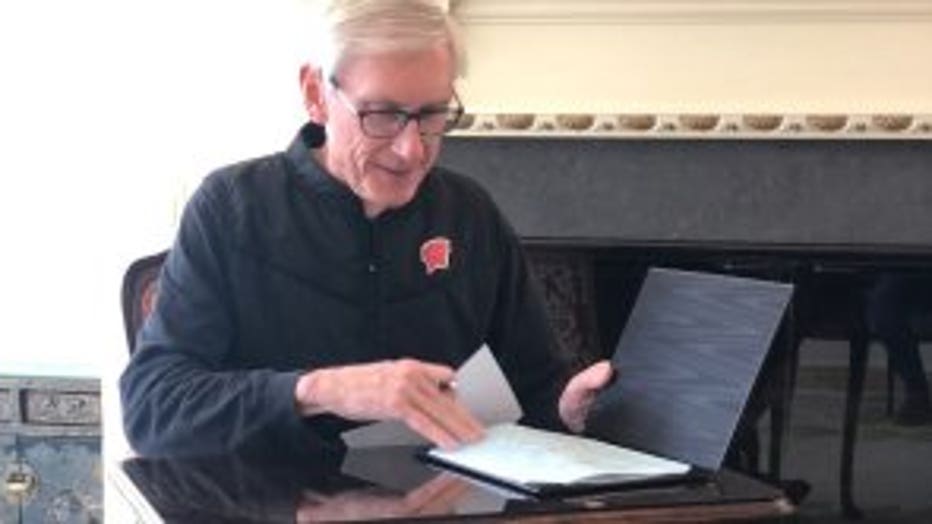
He ripped the final version in a statement, complaining that it doesn't provide hazard pay or worker's compensation to first responders, childcare providers and health care workers and doesn't do anything meaningful for small businesses and farmers.
“The bill I will sign falls short of what is needed to address the magnitude and gravity of what our state is facing, but I am not willing to delay our state’s response to this crisis,” Evers said.
The bill largely ensures that Wisconsin can capture the $2.3 billion allocated to the state under the federal stimulus bill, including higher Medicaid payments and unemployment benefits. The Legislature’s budget committee would be allowed to allocate up to $75 million in funding until up to 90 days after the public health emergency ends.
The measure also would waive the state’s one-week waiting period to receive unemployment for anyone who applies between March and Feb. 7, 2021, and ban certain insurers from prohibiting coverage based on a COVID-19 diagnosis. Furthermore, it would ease the licensing and credentialing processes for health care workers, reduce nurse training hour requirements and render health providers immune from civil liability for services provided during the pandemic. Local municipalities also could choose to defer their residents’ property tax payments.
The Assembly passed the measure 97-2 on Tuesday during what was the Legislature's first ever virtual meeting to comply with social distancing guidelines. Two-thirds of the body's 99 members voted via videoconferencing, while the rest voted from scattered seats around the chamber, sometimes with rows of empty seats between them.
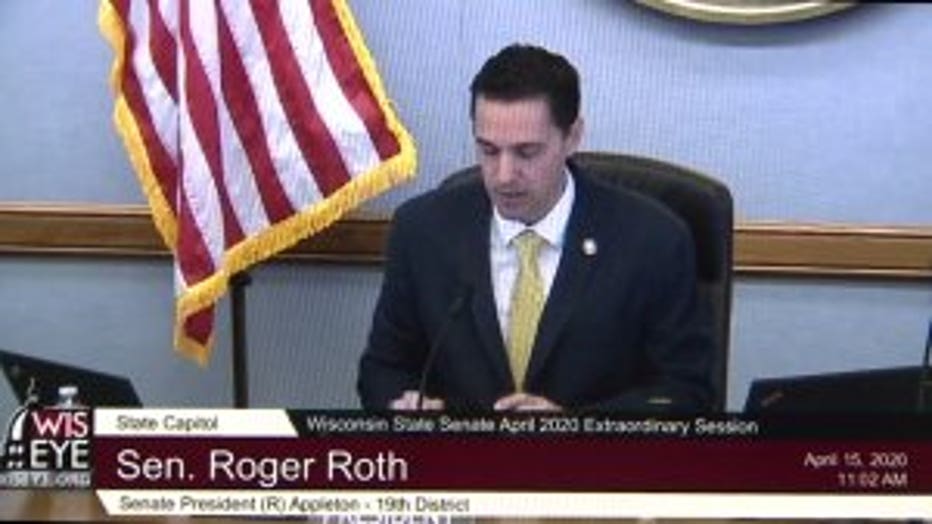
Senate President Roger Roth
The Senate followed suit with its first-ever virtual meeting on Wednesday. The session was run out of a hearing room on the Capitol's fourth floor. Senate President Roger Roth, a Republican, and Minority Leader Jennifer Shilling were the only senators in the room, along with Chief Clerk Jeff Renk's staff. Everyone was seated at least 6 feet apart. The rest of the Senate appeared via videoconferencing from their homes or Capitol offices.
The technology was shaky, with lags between Roth initiating contact with senators and their responses. Senators voted by clicking a button on their screens; one of Renk's staffers had to read off their votes to Roth, who cautioned senators several times that if they thought their vote was recorded incorrectly they should notify Renk by email.
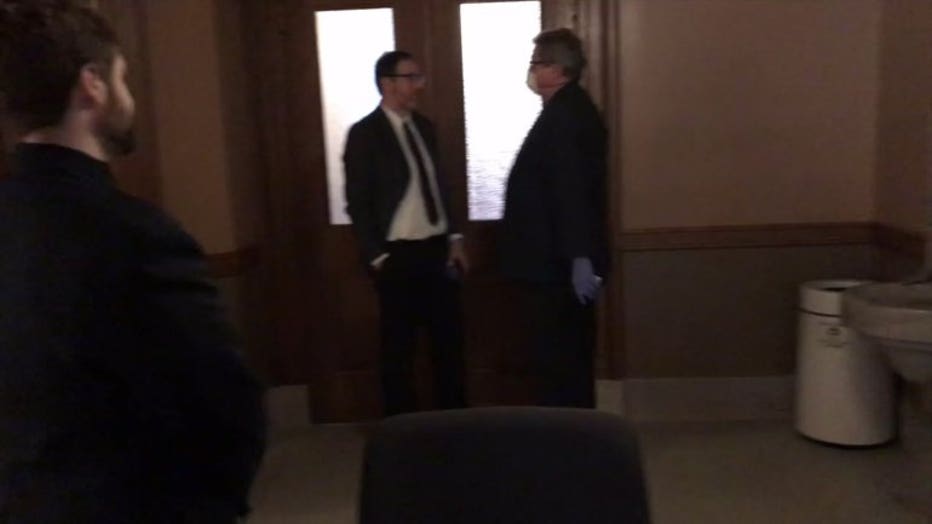
Senator Tim Carpenter
Democrats complained bitterly about the approach. Sen. Chris Larson said the set-up was frustrating. Sens. Lena Taylor and Tim Carpenter both complained that Roth never let them speak. Carpenter issued a statement to media outlets during the middle of the session complaining that Roth had barred him from attending the session in-person in the hearing room, and Taylor was the only senator who didn't cast a vote. She said in a phone interview that Roth wouldn't allow her to vote.
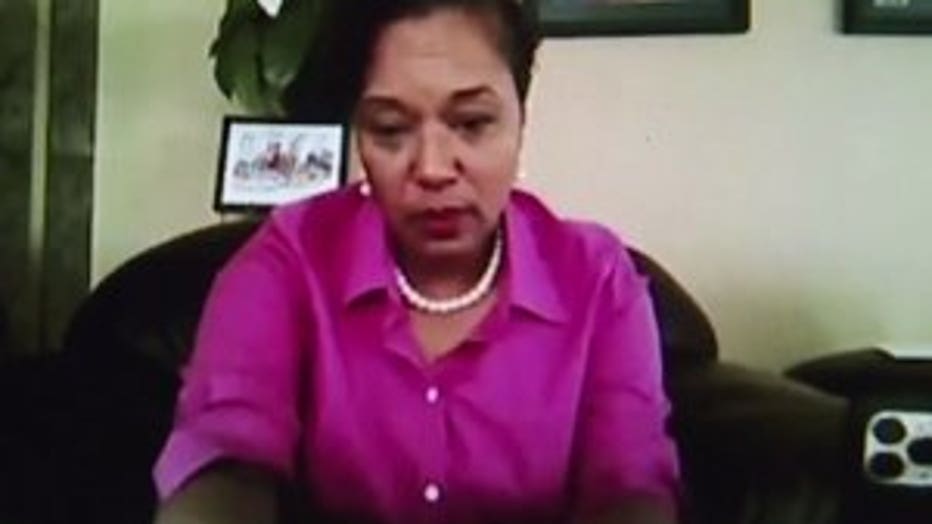
Senator Lena Taylor
“I’m just stunned that someone could be so inhumane,” Taylor said. “He denied democracy in Wisconsin. He denied the people dying.”
Roth said in a phone interview after the session had ended that all the senators understood there wasn't room to maintain social distancing in the Senate chamber or in the hearing room and that only he, Shilling and Senate Majority Leader Scott Fitzgerald would be allowed to attend in person. Fitzgerald opted to appear via videoconferencing from his office.
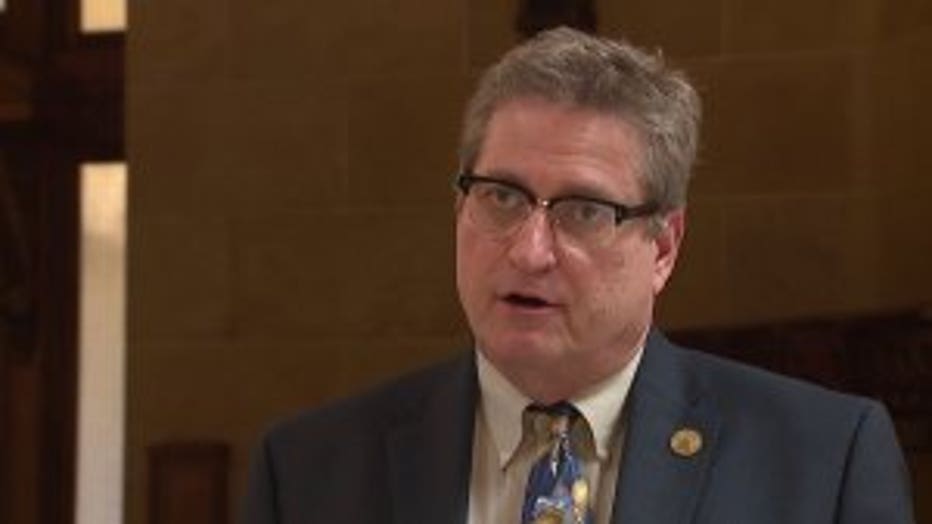
Senator Tim Carpenter
“Anyone who is shocked or outraged, it's just a load of malarkey at this point,” Roth said.
Carpenter tried to speak during roll call votes when comments aren't allowed or after Fitzgerald had made motions that weren't debatable under Senate rules, Roth said. As for Taylor, she apparently couldn't unmute her line, he said. The Legislature's techs tried to help her but couldn't get her connected, he said.
In the end, the chamber approved the bill 32-0, with Taylor the only senator who didn't cast a vote.
Reaction to Senate passage of the virus relief package
Gov. Tony Evers
“My pen has been waiting for weeks to sign legislation that guarantees Wisconsin will capture our fair share of federal dollars under the CARES Act and ensures workers experiencing unemployment and underemployment won’t be forced to wait an extra week for needed benefits to kick in. This bill is finally a step in the right direction, but there is much more work to be done.
“Although I remain concerned about what is missing from this legislation I have called for this bill to be sent over for my signature as soon as possible. The bill I will sign falls short of what is needed to address the magnitude and gravity of what our state is facing, but I am not willing to delay our state’s response to this crisis.
“This bill does not provide hazard pay or workers compensation for all frontline and critical workers like first responders, childcare providers, and healthcare workers who are risking their lives going to work every day. This bill lacks meaningful support for small businesses and farmers who are struggling to make ends meet and includes no additional investments in our businesses or farmers through WEDC’s successful 20/20 program.
“Our state is facing significant challenges as we respond to and prevent the spread of COVID19. The bottom line is that we have to do everything we can to keep our families, our neighbors, and our communities safe while also looking towards our economic recovery. People across our state are hurting. We have asked Wisconsinites to make sacrifices so we can keep them safe, and the Legislature needs to do their part.
“My administration has been working to do as much as we can to respond to COVID-19 but we need to have the flexibility and resources to be able to provide necessary support for the people of our state. It’s clear that more legislation will be needed to meaningfully address COVID-19 in Wisconsin and help workers, families, businesses, and farmers.”
Attorney General Josh Kaul
“The men and women on the front lines of the fight against the coronavirus make a remarkable sacrifice every day they go to work: they put their own health, and in many cases the health of their family members, at risk. The front-line workers making this sacrifice are protecting our communities and helping to save lives.
“We should be doing more to support these essential workers than simply ensuring that they’re able to receive worker’s compensation benefits if they contract COVID-19. But, because of an amendment that gutted a protection for first responders that originally had been included in the coronavirus bill, the legislation that passed the state legislature doesn’t even do that.
“To be clear, the full bill that the legislature has passed is a good first legislative step in addressing the public health emergency caused by the coronavirus. Suspending the waiting period for unemployment benefits and obtaining a substantial amount of additional federal funding for Medicaid, as well as other aspects of this legislation, will make a real difference for many Wisconsinites. But the legislature should return and pass new legislation that provides meaningful worker’s compensation protection for front-line workers in Wisconsin.”
State Sen. Lena Taylor (D-Milwaukee)
“On March 13th, I made an initial request that the Wisconsin State Legislature take up a special session to respond to the COVID-19 pandemic. Understanding both the obvious and unintended consequences of policy decisions to minimize the social spread of Coronavirus, we should have met sooner. Yet, over a month later, here we stand. To say, that I am frustrated at the cavalier attitude that some of my Republican colleagues have displayed throughout this public health emergency, is the understatement of the year.
"To further compound the crisis, today I and other members of the legislative body, were deliberately denied the opportunity to speak at key moments during the senate session.
Representing portions of the hardest hit city and county of the state, the behavior of republican leadership was unconscionable. We have watched as they have used the Coronavirus to suppress the vote of many state residents and today, they used it to suppress the voice of some Democratic legislators.
"While the elements of today’s bill were necessary, there are many holes in our response to the needs of Wisconsin residents. Republicans marginalized many of the issues that would have provided balanced resources and action to address hazard pay for essential and frontline workers equally. Small business owners, the elderly and families needing help with food or housing are left to fend for themselves. In fact, many Wisconsinites, from local governments to hospitals and healthcare facilities providing critical COVID-19, are being asked to shoulder the brunt of the state’s response. In failing to provide many of the additional public health resources, we have taken a piecemeal approach to governing. The broader question is, what is the price our state will pay for the lack of a comprehensive approach to dealing with this crisis?"
State Sen. Chris Larson (D-Milwaukee)
“As we face the toughest health and economic crisis in a generation, our state senate finally convened to do quite possibly the least they could, as late as possible. Republicans have had weeks to prepare and confront the COVID-19 crisis that continues to devastate our neighbors' health, jobs, and daily lives. Today’s virtual session and legislation showed their failure to meet this moment in history. Instead of fostering public discourse and bipartisan debate, Republican’s stifled the discussion by using the pandemic as an excuse to shut down debate and instead rush through the weakest piece of legislation they could muster. They denied senators' clear requests to discuss and improve on the lackluster GOP proposal.
“The proposal brought forward by legislative Republicans is an insufficient attempt to respond to this unprecedented public health crisis, it is deeply disturbing that they rejected all efforts at bipartisan compromise.
“The Republican bill does not provide support for families needing child care. It rejected providing hazard pay to our frontline healthcare and service workers. It failed to support local governments in their efforts to combat COVID-19. It also fell short of offering help to those who need medical care due to COVID-19. Most importantly, it doesn't address the inherent problem of our broken health care system. Even if we had widespread testing (which we don't due to the failure of President Trump), too many avoid going to the doctor because they can't afford the co-pays, deductibles, or cost of care for other ailments, let alone COVID-19. This was not addressed at the state level and has not been addressed at the national level.
“Especially concerning was the lack of concern by GOP leaders over the safety and integrity of our elections. Far too many of our neighbors were disenfranchised this past election. Senate Amendment 1 was intended to ease the burden on the public by providing for electoral integrity and fair access to the ballot by allowing our neighbors across the state to safely vote from home this fall by sending them each a ballot through the mail. Unfortunately, Republican legislators again ignore the health, safety, and dignity of our Wisconsin neighbors by rejecting these reforms for the next election.
“It is clear that Republican leadership is not willing to take bold action to protect our neighbors. Governor Evers, my fellow Democratic Legislators, and I have fought for weeks for a unified, bipartisan response to the COVID-19 crisis. This small band-aid is not going to fix the gaping wound of health and economic distress our neighbors are facing.
“Wisconsin deserves bold action to meet the moment, not political games and weak tea.”
State Sen. Alberta Darling (R-River Hills)
"The COVID-19 pandemic isn't just a health crisis, it's an economic crisis for our state. People are sick, many are without jobs, and businesses are struggling right now.
"This bill makes sure people get the help they need as quickly as possible. It cuts red tape which allows the administration to act quickly to respond to the needs of our constituents.
"I'm proud to support this bill because it's more than bi-partisan. The ideas in this legislation came from Republicans, Democrats, and experts affected by the pandemic and the shutdown. It is truly a Wisconsin-made solution to the crisis we all face.
"What our state needs now is to hear what plan Governor Evers has to restart our economy in a safe way and get people back to work."
State Sen. Duey Stroebel (R-Cedarburg)
“COVID-19 has created challenges for Wisconsin and this legislation is an important step to address COVID-19 and the human costs that have accompanied it. While the bill does not solve all of our problems, it is a start and provides the ability for the Joint Finance Committee to take future action if necessary.
“This bill makes key temporary changes to our existing laws and regulations that will allow federal dollars to help our state more effectively fight COVID-19 and aid those who have been negatively impacted by Governor Evers’ shelter in place order. The bill aligns changes to unemployment benefits, reduces the licensing barriers for entry for health care workers and directs the Wisconsin Economic Development Corporation to develop plans to assist our economic sectors like manufacturing, retail, tourism and agriculture.
“We are fortunate that Wisconsin has not come close to reaching the predicted COVID-19 case and death levels predicted by early models. I renew my call to move to the next phase of our response, planning an organized way to begin reopening Wisconsin. I look forward to continuing to work with my legislative colleagues and Governor Evers to ensure that we balance the impacts of COVID-19 with the freedom and liberty of our constituents and the realities of our economy.”
State Sen. Dan Feyen (R-Fond du Lac)
"We have been working hard in the legislature. Maintaining contact with state and local officials, business leaders, and constituents to determine how we can provide the most impactful relief during the COVID-19 pandemic.
"This broad ranging bill will provide assistance where it is needed most; in our workforce, our healthcare system, our schools, and our economy. I look forward to Governor Evers signing this into law, so that we can start helping those in need."
State Sen. Fred Risser (D-Madison)
"I think this bill is but a small step in the right direction. Quite frankly, this bill doesn’t go far enough. It is unfortunate that given the length of time Republican Leadership took in drafting legislation they chose to ignore many of the priorities laid out in Governor Evers’ COVID-19 bills.
"We must act now to provide hazard pay for healthcare workers on the frontlines of this crisis and ensure that all our healthcare workers have proper PPE, further invest in programs that support small businesses and farmers, and adopt provisions to mail all registered voters a ballot for the remaining 2020 elections so that never again is voting a life or death decision.
"These are but a few of the issues that Wisconsin will need to address as the effects of the global pandemic continue to evolve. I am hopeful that the legislature will continue to meet and work on legislation to provide needed assistance. Wisconsinites who have lost their jobs or are on the verge of losing their business need to know that their government has their back during these trying times."
State Sen. Jennifer Shilling (D-La Crosse)
"This public health crisis is stressful for families and is impacting every facet of our lives. While this legislation is a starting point and a step in the right direction, there is still more work that needs to be done. Action should have been taken weeks ago and this is by no means the only support the legislature can offer. It is time the legislature come to grips with the severity of this virus and help the businesses, families and communities with the long-term ripple effects that COVID-19 will have on our state. Democrats and Gov. Evers want to focus on a comprehensive approach to the health, economic and workforce challenges facing our state. Wisconsinites are resilient, and together we will get through this and move forward."
State Sen. John Erpenbach (D-West Point)
"I am happy that both sides of the aisle were able to come together to pass this long overdue package. However, we still have a lot of work to do to pass meaningful and comprehensive legislation that supports the people who need it the most.
"I joined my Democratic colleagues in introducing three amendments. The first included provisions that were originally introduced by Governor Evers to help push this legislation further in areas such as worker compensation for all frontline and critical workers, investments in businesses and farmers, relief for childcare providers and families, and resources for public health.
"Additionally, Democrats introduced an amendment that would direct that voters in elections during a state of emergency be provided absentee ballots, allow more time for clerks to count the ballots and remove barriers to voting. After the Spring Election, it became clear that there needs to be additional measures in place to protect voters and our democracy. Voters should never have been forced to choose between their health and casting their vote, and this amendment would ensure that what happened last week would never happen again.
"Finally, Democrats introduced an amendment that ensure that the provisions that were passed today would work to provide immediate protection to Wisconsinites should another pandemic happen. Unfortunately, Republicans rejected all of the Democrats’ amendments and stifled the state’s response to COVID-19.
"Bi-partisan action in the face of this pandemic and its fallout has been needed for weeks. We still have work to do and Democrats are ready to come together with Republicans to ensure that our state is equipped to respond to this crisis, and support Wisconsinites in their time of need."

